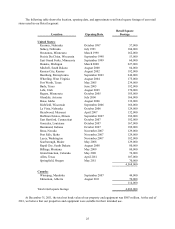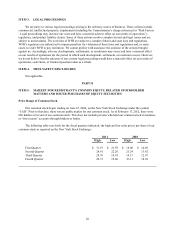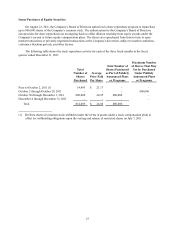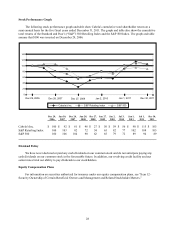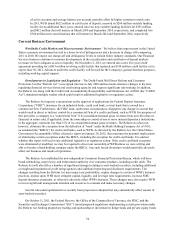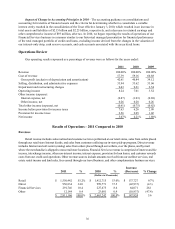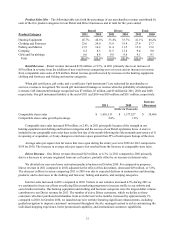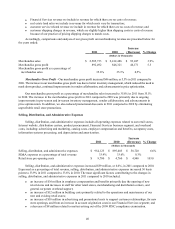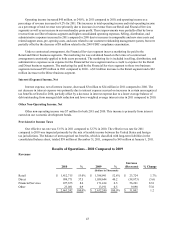Cabela's 2011 Annual Report Download - page 44
Download and view the complete annual report
Please find page 44 of the 2011 Cabela's annual report below. You can navigate through the pages in the report by either clicking on the pages listed below, or by using the keyword search tool below to find specific information within the annual report.34
of active accounts and average balance per account, partially offset by higher customer reward costs.
In 2011, WFB issued $622 million in certificates of deposit, renewed its $260 million variable funding
facility for an additional three years, entered into two new variable funding facilities for $353 million
and $412 million that will mature in March 2014 and September 2014, respectively, and completed two
$300 million term securitizations that will mature in March 2014 and September 2014, respectively.
Current Business Environment
Worldwide Credit Markets and Macroeconomic Environment – We believe that improvement in the United
States economic environment has led to a lower level of delinquencies and a decrease in charge-offs comparing
2011 to 2010. We expect our charge-off and delinquency levels to remain below industry standards. Our Financial
Services business continues to monitor developments in the securitization and certificates of deposit markets
to ensure we have adequate access to liquidity. On November 2, 2011, we entered into a new five-year credit
agreement providing for a $415 million revolving credit facility that replaced our $350 million credit facility set to
expire June 30, 2012. Advances under the credit facility will be used for the Company’s general business purposes,
including working capital support.
Developments in Legislation and Regulation – The Dodd-Frank Wall Street Reform and Consumer
Protection Act (the “Reform Act”) was signed into law in July 2010 and has made extensive changes to the laws
regulating financial services firms and credit rating agencies and requires significant rule-making. In addition,
the Reform Act along with the Credit Card Accountability Responsibility and Disclosure Act of 2009 (the “CARD
Act”) mandated multiple studies which could result in additional legislative or regulatory action.
The Reform Act imposes a moratorium on the approval of applications for Federal Deposit Insurance
Corporation (“FDIC”) insurance for an industrial bank, credit card bank, or trust bank that is owned by a
commercial firm. Furthermore, the FDIC must, under most circumstances, disapprove any change in control that
would result in direct or indirect control by a commercial firm of a credit card bank, such as WFB. For purposes of
this provision, a company is a “commercial firm” if its consolidated annual gross revenues from activities that are
financial in nature and, if applicable, from the ownership or control of one or more insured depository institutions,
in the aggregate, represent less than 15% of its consolidated annual gross revenues. The Reform Act does not,
however, eliminate the exception from the definition of “bank” under the Bank Holding Company Act of 1956,
as amended (the “BHCA”) for credit card banks, such as WFB. As directed by the Reform Act, the United States
Government Accountability Office released a report on January 20, 2012, that examines the potential implications
of eliminating certain exceptions under the BHCA, including the exception for credit card banks. It is unclear
whether this report will lead to any additional legislative or regulatory action. If the credit card bank exception
were eliminated or modified, we may be required to divest our ownership of WFB unless we were willing and
able to become a bank holding company under the BHCA. Any such forced divestiture would materially adversely
affect our business and results of operations.
The Reform Act established the new independent Consumer Financial Protection Bureau, which will have
broad rulemaking, supervisory, and enforcement authority over consumer products, including credit cards. The
Reform Act will also affect a number of significant changes relating to asset-backed securities, including additional
oversight and regulation of credit rating agencies and additional reporting and disclosure requirements. The
changes resulting from the Reform Act may impact our profitability, require changes to certain of WFB’s business
practices, impose upon WFB more stringent capital, liquidity, and leverage ratio requirements, increase FDIC
deposit insurance premiums, or otherwise adversely affect WFB’s business. These changes may also require WFB
to invest significant management attention and resources to evaluate and make necessary changes.
Several rules and regulations have recently been proposed or adopted that may substantially affect issuers of
asset-backed securities.
On October 11, 2011, the Federal Reserve, the Office of the Comptroller of Currency, the FDIC, and the
Securities and Exchange Commission (“SEC”) issued proposed regulations implementing certain provisions under
the Reform Act limiting proprietary trading and sponsorship or investment in hedge funds and private equity funds



